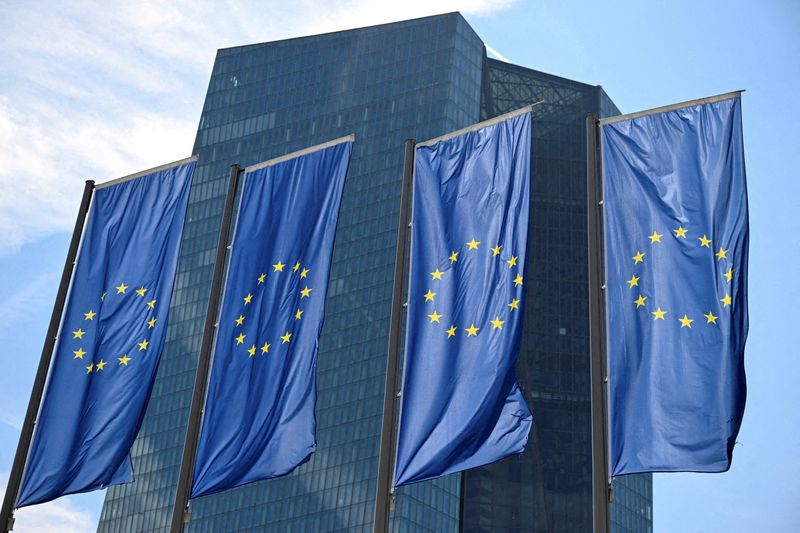By Balazs Koranyi
(Reuters) - European Central Bank policymakers have begun to debate whether interest rates need to be lowered enough to start stimulating the economy, ending years of economic restriction, conversations this week with half a dozen sources indicate.
The ECB has been cutting rates quickly this year but policymakers have so far said the goal is a neutral setting, where the central bank is neither slowing nor stimulating growth in the hopes this will keep inflation stable.
While the sources, who spoke on condition of anonymity, stressed that any consensus was still long off, it marks a significant shift in the policy-making debate which could ultimately lead to the bank cutting rates sooner and by more than currently expected.
The shift comes as the economic fortunes of the bloc are deteriorating quickly and inflation is well below earlier predictions, raising the risk that price growth could undershoot the ECB's target, much like it did for nearly a decade before the pandemic.
This is prompting some -- a still small but growing group of policymakers -- to argue that the ECB has fallen behind the curve and deeper cuts will be needed than earlier thought to prevent inflation from going too low.
They are also making the case for the ECB to revisit its guidance for a "meeting-by-meeting" approach to policymaking and to drop a reference to restrictive rates as a signal that it is taking downside risks seriously.
"I think neutral is not enough," a source with direct knowledge of the discussion said. "That decision is still some time away but the economy has been stagnating for two years and there is no recovery in sight."
Gediminas Simkus, head of the Lithuanian central bank and an ECB governing council member, has been one of the first to publicly discuss this risk.
"If disinflation processes get entrenched... it's possible that rates will be lower than the natural level. We've had that for decades," he said this week. 'Neutral' is sometimes referred to as 'natural'.
An ECB spokesman declined to comment.
UNCERTAINTY
One uncertainty in the debate is that the neutral rate is considered unobservable and so there is no consensus on what it is.
"If you were to ask me today, "Where is it?', the honest answer is, 'I don't know'," ECB President Christine Lagarde said this week.
But there are plenty of estimates out there. The International Monetary Fund puts it at 2.5%, ECB watchers polled by the bank see it at about 2.25%, ECB staff thinks it's close to 2% or just above it, and market pricing suggests it is now below 2%. Individual policymakers see even bigger ranges.
A difficulty is that the difference between the top and the bottom of these ranges could be as much as three rate cuts.
By contrast, the median estimate for the longer-run "neutral" level is seen at 2.9% at the U.S. Federal Reserve, but there is similarly large variation around this figure and policymakers argue that in the short term the median could also be quite different.
The key argument for cutting ECB rates below neutral is that economic growth is sluggish and the long-awaited recovery is just not coming. This means the ECB is now restricting the economy much more than it thought and high rates are depressing demand.
Without this growth rebound, domestic inflation will also slow and the labour market could quickly soften, adding to the downward pressure on prices.
While Simkus is a rare voice explicitly talking about possible recourse to sub-neutral rates, other policymakers have been warning of the risk of inflation falling too low.
Portugal's central bank chief Mario Centeno has long been warning about inflation falling too low.
"I see more risks in undershooting target inflation than the other way around and most of the risks that we see, the downside risks that we see right now in our projections, they are endogenous," Centeno said this week.
French central bank chief Francois Villeroy de Galhau also argued that the ECB was facing a risk of undershooting its target
"There is ... (a) risk that inflation undershoots, especially if growth remains subpar," he said this week. "We can see the expected soft landing, but not a further take-off."

None of the sources advocated bigger rate cuts compared with the ECB’s current rhythm of 25 basis point moves and said that the actual decision on going below the neutral was still months away and the outlook could change by then.
(This story has been refiled to fix a typo in the headline)